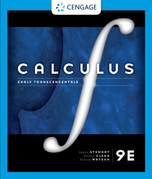?A circle \(C\) of radius \(2r\) has its center at the origin. A circle of radius \(r\)
Chapter 16, Problem 6(choose chapter or problem)
A circle \(C\) of radius \(2r\) has its center at the origin. A circle of radius \(r\) rolls without slipping in the counterclockwise direction around \(C\) A point \(P\) is located on a fixed radius of the rolling circle at a distance \(b\) from its center, \(0<b<r\). [See parts (i) and (ii) of the figure below.] Let \(L\) be the line from the center of \(C\) to the center of the rolling circle and let \(\theta\) be the angle that \(L\) makes with the positive \(x\) -axis.
(a) Using as a parameter, show that parametric equations of the path traced out by \(P\) are
$$x=b \cos 3 \theta+3 r \cos \theta y=b \sin 3 \theta+3 r \sin \theta$$
Note: If \(b=0\), the path is a circle of radius \(3r\); if \(b=r\), the path is an epicycloid. The path traced out by \(P\) for \(0<b<r\) is called an epitrochoid.
(b) Graph the curve for various values of \(b\) between 0 and \(r\).
(c) Show that an equilateral triangle can be inscribed in the epitrochoid and that its centroid is on the circle of radius \(b\) centered at the origin. Note: This is the principle of the Wankel rotary engine. When the equilateral triangle rotates with its vertices on the epitrochoid, its centroid sweeps out a circle whose center is at the center of the curve.
(d) In most rotary engines the sides of the equilateral triangles are replaced by arcs of circles centered at the opposite vertices as in part (iii) of the figure. (Then the diameter of the rotor is constant.) Show that the rotor will fit in the epitrochoid if \(b \leqslant \frac{3}{2}(2-\sqrt{3}) r\).
Equation Transcription:
Text Transcription:
C
2r
r
C
P
b
0<b<r
L
C
Theta
L
x
P
x= b cos 3 theta + 3rcos theta y= b sin 3theta +3r sin theta
b=0
3r
b=r
P
0<b<r
b
r
b
b<or =3/2(2-square root of 3) r
Unfortunately, we don't have that question answered yet. But you can get it answered in just 5 hours by Logging in or Becoming a subscriber.
Becoming a subscriber
Or look for another answer
